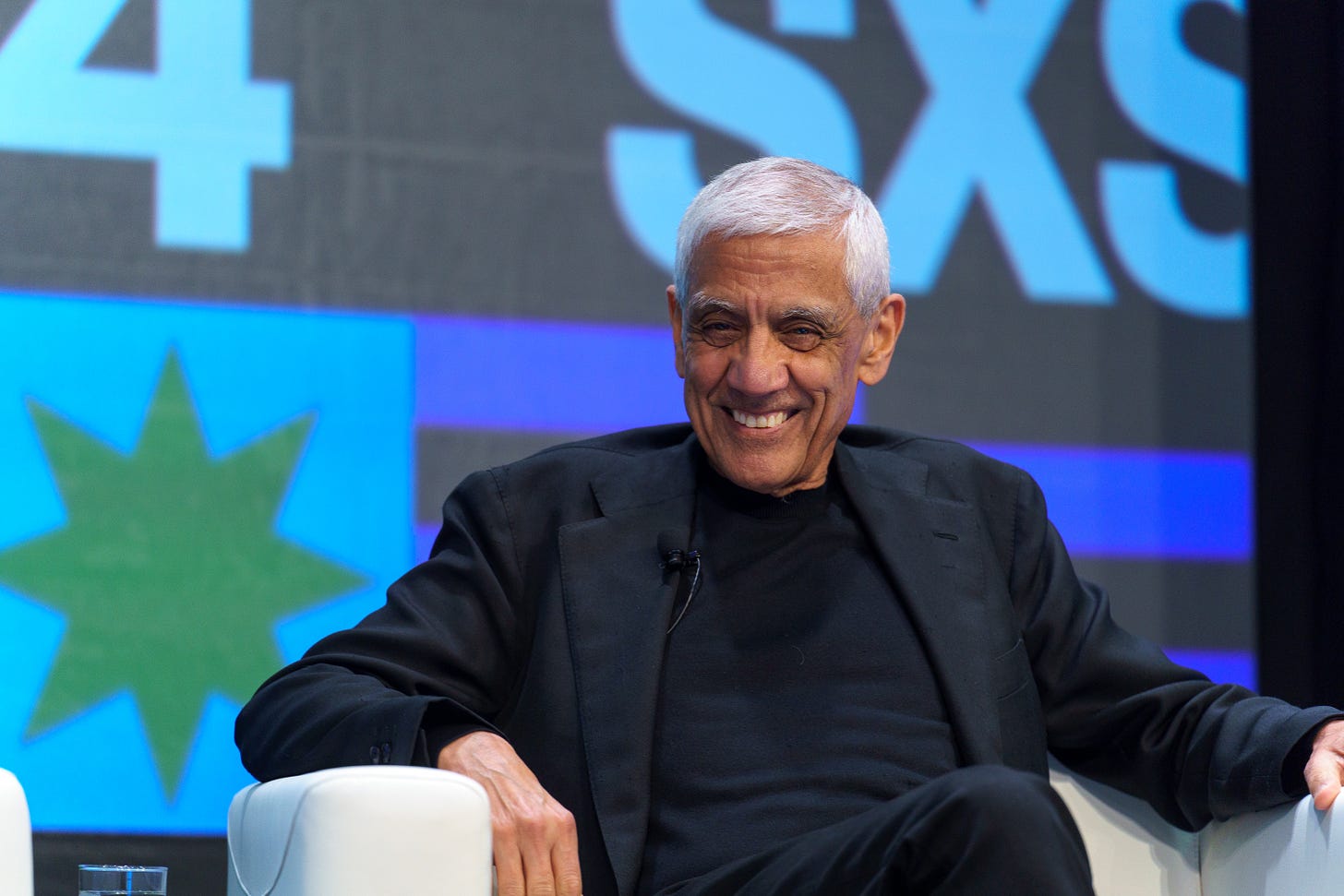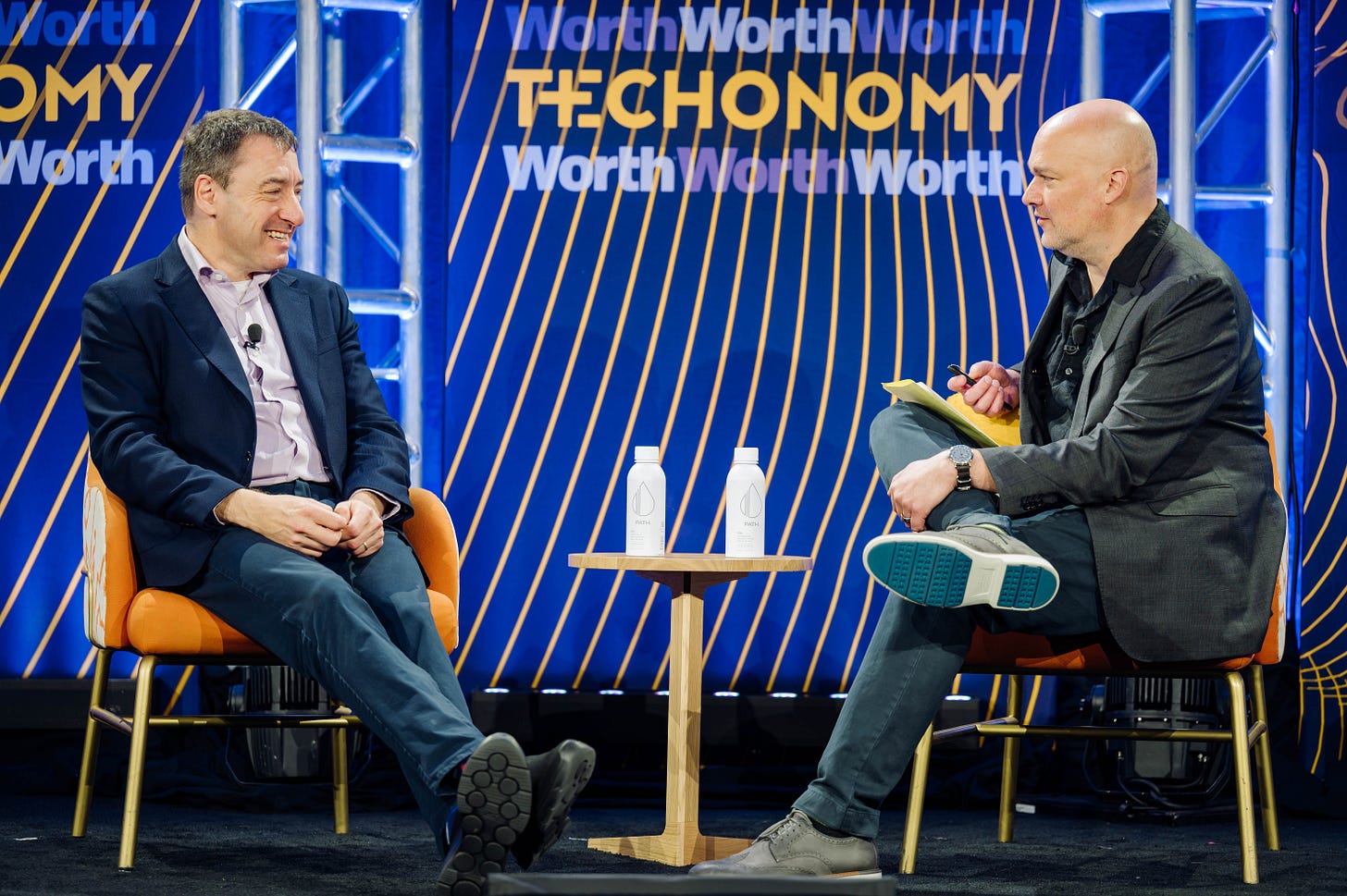Khosla’s Playbook for an AI Future: Equal Access, Ethical Choices, and a New Definition of Prosperity
Also, see how I'm are using AI to build the Techonomy 24: Leading with Intelligence conference. A modest, but time saving application
A few weeks back, Vinod Khosla, co-founder of Sun Microsystems and one of the most powerful voices in tech, posted a 13,150-word essay titled AI: Dystopia or Utopia. Helpfully, he also posts a 3,150-word summary. It took me until now to get through all of it. But now I can offer you an even shorter summary you can get through in five minutes,
Vinod Khosla’s vision for AI isn’t just another optimistic forecast; it’s a blueprint that challenges us to rethink society from the ground up. For Khosla, AI is the steam engine of our era, a comparison that reveals just how transformative he believes this technology will be.
“AI amplifies and multiplies the human brain,” he argues, “much like steam engines once amplified muscle power.” It’s more than an analogy—it’s a call to action, urging us to consider the sweeping changes this technology could enable if we have the courage and foresight to steer it wisely.
Khosla doesn’t shy away from the thornier issues surrounding AI. He’s fully aware of the short-term disruptions: people will lose jobs, wealth could concentrate even further at the top, and traditional economic models might need a reboot. But he’s also adamant that these aren’t inevitable outcomes.
“Capitalism operates by the permission of democracy,” he says, reminding us that the future of AI isn’t something that will just happen to us—it’s something we can shape through policy, social choice, and economic innovation. For Khosla, a universal basic income or strategic redistribution of wealth isn’t a pipe dream; it’s a necessary step to prevent the inequality AI could exacerbate if left unchecked.
While Khosla acknowledges the dystopian fears around AI, he doesn’t buy into the doom-and-gloom scenarios. In his view, these fears are “largely unfounded, myopic, and harmful.” He sees AI as a tool that could address pressing challenges, like labor shortages, by increasing productivity to the point where we could shift to a three-day workweek. His fears about AI are more pragmatic and rooted in geopolitical risks than some Hollywood vision of sentient AI gone rogue.
As he puts it, the real threat isn’t “sentient AI” but the risk of “nefarious nation-states… making AI dangerous for the West.” This perspective shifts our attention to the real stakes: if authoritarian regimes dominate AI, they could use it to erode democratic values and reshape global power.
The potential Khosla sees in AI is breathtaking—and it’s not just about solving first-world problems. Imagine “near-free AI tutors to every child on the planet” or democratized healthcare where “near-free AI physician expertise” makes high-quality medical advice accessible worldwide. It’s a vision not limited to Silicon Valley boardrooms or Wall Street elites; it’s about giving billions of people access to knowledge, health, and opportunity.
In Khosla’s words, “AI could address climate change by optimizing energy use, reducing emissions,”—and when he talks about the democratizing power of AI, it’s hard not to be inspired by the possibilities he sees for a more equitable world.
Khosla also raises a fascinating question about how we’ll measure prosperity in this AI-driven future. With deflation likely lowering the cost of goods and services, traditional economic indicators like GDP could become obsolete. “GDP may not reflect well-being,” he argues, calling for new metrics that reflect the real value AI could bring to society, not just the dollars and cents.
What Khosla offers is more than a tech utopia; it’s a vision of a world where people are free to pursue what excites them, unburdened by the economic treadmill of traditional labor. He sees AI as an enabler for a redefined society, one where success isn’t just about output or economic efficiency but about fulfillment, creativity, and human connection. The question he leaves us with is simple yet profound: Are we willing to steer AI toward a future that aligns with our highest values? As he points out, “The future will be what we decide to guide this powerful tool toward.”
The question now, especially given the election results, is who defines those high values? And who will do the guiding?
With Techonomy 24 just around the corner and we are putting the final touches on the program. We’re immersed in back-to-back prep calls with our speakers, finalizing the agenda, and ensuring every conversation will be as memorable as possible.
This week, I've been in fascinating discussions with speakers bringing unique perspectives to the table. Yesterday, in a conversation with X Eyee, we found ourselves exploring a potent line of thought: “Now, we have to start thinking about how to protect ourselves in the context of the way that the rules work within the states and the cities that we reside in, to protect ourselves from these systems and not leave it to the folks who have money to gain by having no rules.”
That quote captures the growing focus on local AI regulation and the urgent need for nuanced, grounded policies that protect users while encouraging responsible innovation. X will be interviewed on stage by Emily Forlini, senior reporter at PCMag.com
In addition to speaking with X, I connected with Igor Jablokov of Pryon, who shared his insights on AI in knowledge management, and Dr. Xuedong (XD) Huang from Zoom, whose perspective on AI-powered communication is set to be a conference highlight.
Of course, AI is helping us plan our conference on AI. Otter.ai transcribes each call and then summarizes it, helping us capture the essence of each conversation more efficiently and integrate these insights directly into the conference programming. Not only does it pull the full text, but the summary and key points are remarkably on point. Plus, it lets me focus on the people on the call and not type or scribble notes on paper.
But to be clear, all of this digital prep work is designed to enhance our in-person discussions next week. It’s all part of making Techonomy 24 a platform for meaningful dialogue and real-world impact. I look forward to seeing you at Civic Hall, where we’ll dive deep into these essential issues. We still have seats available. Or just come to the reception and the Aloe Blacc show.
Join us for this unmissable day of bold ideas, networking, and candid discussions. Use the code “TE-ALUM” to get $200 off the price.



